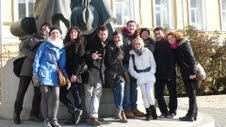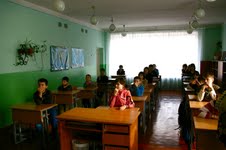Although I am an active JE-F member since 2007, it was the first time I seized the opportunity to participate to such an international activity. Of course, as many Europeans from my generation, I studied in an international environment, which put me in contact with lots of young people from everywhere in the world, and undoubtedly opened my mind to other cultures and ways of thinking. But this week in Ukraine was actually my first international exchange. This is probably the reason why I was so eager to take from it as much benefit of it as I could, while bringing my own best contribution to the exchange; this is also the reason why it had such an impact on my personal development, and hopefully, on the collective development of my NGO.

Without any doubt, this intensive one week training fostered my personal and professional skills, in a way that I would qualified as “non-formal”. Non-formal learning is based on the very idea of trainers involving participants in their teaching, and participants taking an active part in the learning process. In this respect, I discovered in Kiev new methods of teaching and learning that sincerely impressed me. These methods, which were particularly relevant to the topic of the exchange – volunteering –, could actually be used to raise awareness on any to any topic related to citizenship, such as social inclusion, mutual understanding, or participation to political life. As a young secondary school teacher, I clearly perceived the potential of these methods in teaching compromise-making, team spirit and resolution of conflicts. I am now convinced that such methods would clearly have an added value in formal educative or professional frameworks, and willing to try it in my daily work with children.
But an exchange is not only a matter of acquiring new skills; it is also an occasion to meet new people. In this case, just imagine fifty young people coming from ten different countries, all active in their NGO, gathered for one week in the same place. A huge seven days brainstorming! As a national board member of JE-F France, this was an extraordinary occasion for me to exchange good practices and to learn from others’ methods and approaches. To give you an example, I had the opportunity to participate to an awareness-raising action in a Ukrainian orphanage, with a focus on environmental issues. Being in charge of an activity which promotes Europe at school, I found this action particularly inspiring for my own activities, and came back to France with the desire to build a new partnership with the French authorities in charge of state’s orphanages management. More generally, this exchange was for the French delegation an occasion to enlarge our network, in the prospect of future projects.

Last but not least, the main achievement of this project was the substitution in my mind of “intercultural dialogue” for “cultural diversity”. Born in a French suburban area, I grew up in a kind of melting pot, facing radically different ways of thinking. This experience made me very attentive to cultural differences, in a positive way. While the perspective to discover different cultures had been a clear incentive for me to participate to the exchange, I found these differences weak and almost meaningless. To my own astonishment, being in contact during one whole week with so many people from different countries made me rather feel how similar we are. I was stunned by the facility we all had in overcoming cultural barriers, especially while solving difficulties or trying to reach common goals. Our common belonging to the same world was no longer an intellectual concept; and the fact that we have values in common was just terribly obvious.
![Kiev Youth [Ex]change or how a JEF seminar really made a difference to me](local/cache-gd2/75/36e4513d96ed6736537c541815bf4e.jpg?1699657826)

Follow the comments: |
|
